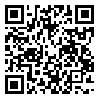BibTeX | RIS | EndNote | Medlars | ProCite | Reference Manager | RefWorks
Send citation to:
URL: http://yafte.lums.ac.ir/article-1-1489-en.html
Background : The quality of mother-child relationship play an important role in personality shaping, social functioning and mental health of children in the future . This study was designed to evaluate the prognostic factors of mother - child relationship patterns.
Materials and Methods: In this cross sectional study 110 mothers admitted to children's hospital of Khorramabad selected by consecutive sampling method. Data gathering tool was Mother - Child Relationship Evaluation (MCRE) questionnaire. At first the view points of the mothers about four communication patterns including: over protection, child rejection, overneglignce and child acceptance were examined, then according to each pattern cut off, the type of communication pattern was determined. Fisher's exact test and linear regression were used for data analysis.
Results: The mean age of participants was 28.6±6.46. Communication pattern in 66.4% of the mothers was over protection and 19.1% of them had overneglence pattern. Also communication pattern in 12.8% of the participants was child acceptance and 1.8% followed from child rejectoin communication pattern. A significant statistical relation was seen between age, education level, marital status, mothers residence and pregnancy status with the pattern of their relationship (P <0.05). In linear regression analysis, most important factors in predicting the communication pattern were single parent and unplanned pregnancy.
Conclusion: Raising awareness of mothers through workshops can increase proper child skills and led to the development of social skills and reducing child behavior problems in the future.
Received: 2014/03/1 | Accepted: 2014/03/1 | Published: 2014/03/1
| Rights and permissions | |
 |
This work is licensed under a Creative Commons Attribution-NonCommercial 4.0 International License. |





